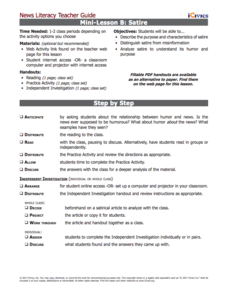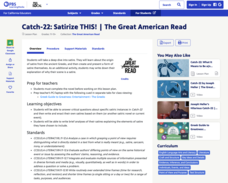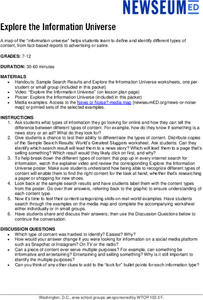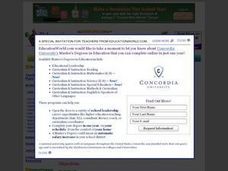Curated OER
Satire and The Adventures of Huckleberry Finn
Does Mark Twain’s satire become sarcasm and does he cross the line of propriety in The Adventures of Huckleberry Finn? As an introduction of satire, class members view an excerpt from The Daily Show and discuss Stewart's use of this...
iCivics
Mini-Lesson B: Satire
Hey, what's so funny? Explore the use of satire in a variety of media with a hands-on lesson. Fourth in a five-part journalism series from iCivics, the activity introduces satirical language in print and online. Pupils work alone or in...
PBS
Catch-22: Satirize This!
Some assignments are great, some can become great, and some have greatness thrust upon them. This one is great. After completing Joseph Heller's classic satire, Catch-22, groups craft and present their own political satire.
Curated OER
Comedy Across the Curriculum
The New York Times Learning Network provides the resources that permit pupils to examine and then write and perform a fake news broadcast in the vein of “The Daily Show” or “Saturday Night Live” Weekend Update. The generated reports...
Curated OER
Literary Newspaper: Candide
Prejudice? Religious intolerance? Political sedition? Class distinction? Plight of women? Voltaire satire, anyone? A literary newspaper offers an opportunity for readers of Candide to make text-to-self and text-to-world connections as...
Curated OER
Elements of Satire
Students analyze satirical articles. In this elements of satire lesson, students read and analyze satirical articles from newspapers. They create Venn diagrams to compare and contrast articles. Students use calculators to create...
Curated OER
Literature: Satire in the American Dream
Eleventh graders examine cartoons for examples of satire, irony, and sarcasm. They write essays about cartoons, art work, or literature analyzing it for satirical elements. Finally, they create their own piece in one of the three areas...
Curated OER
Satire in Fiction
Twelfth graders identify satire in various fictional texts. In this language arts lesson, 12th graders will learn to define satire, parody, and caricature. Students will identify different forms of satire in historical and modern-day...
Curated OER
Redistricting: Drawing the Lines
Difficult redistricting concepts are covered in a context that will make it understandable to your government scholars. They begin with a KWL on the term redistricting and then watch a video to answer some questions. They analyze...
Curated OER
DR-TA Reading Strategy
Foster critical thinking skills by using the DR-TA Strategy with Jonathan Swift’s “A Modest Proposal.” Class members read portions of the essay, stop and discuss what is happening, make predictions based on evidence from the text, and...
Curated OER
Fighting Fire With Satire
Students consider satire in the news by exploring various sources of "fake news," and then creating their own political satire in the form of a skit, news article, or cartoon.
Curated OER
Marketing to Teens: Parody Ads
High schoolers deconstruct advertising messages by analyzing parody ads and exploring the purpose of satire. Then they create their own parodies based on real ads discussed in class. A creative activity to extend any study of media,...
iCivics
Mini-Lesson: Presidential Succession
Who is in line for the presidency? Learners research the line of succession in the executive branch. They analyze the role the cabinet plays in a situation where the president and vice president are not able to serve. Along the way,...
University of Virginia
Analyzing Social Commentary in The Adventures of Huckleberry Finn
The Adventures of Huckleberry Finn continues to be one of the most frequently banned books. The satire and social commentary present challenges when using the book as a core text. Direct readers' attention to how Twain uses plot,...
Newseum
Explore the Information Universe
Distinguishing among different types of content when conducting online searches can be a challenge. An informative resource helps researchers identify different types of content, from fact-based reports to ads, from propaganda to satire....
Curated OER
Poetry Shopping Spree
Scholars demonstrate the ability to evaluate authors' use of literary elements such as metaphor, simile, personification, imagery, and onomatopoeia. They are provided with a checklist and must shop for poems that contain the poetry terms...
Curated OER
Tee-Hee T.V.
Students examine the concept of satire by reading lyrics to a song and reading "Soap and the Campus: A Web-Site Spoof Succeeds." They create treatments for parodies based on current television shows.
Curated OER
Funny Business
Students discuss how much they understand of satire and parody. They read an article about an Iraq news parody show. They create and act out their own parody skit. They write an essay about using humor in grave situations.
Curated OER
"how I Edited an Agricultural Paper Once"
Students identify the point of view of the story. They describe tone of story using at least 3 examples and describe satire and provide at least 3 examples. They identify and describe at least 3 examples of irony and write and share a...
Benjamin Franklin Tercentenary
From Ben’s Pen to Our Lives
What would Ben do? Jumping off from the pseudonymous letters Ben Franklin fooled his older brother into publishing when he was still a teenager, young literary lovers dive into acting, writing, and addressing a local issue with wit and...
Facing History and Ourselves
Identity and Labels
Scholars look at the connections between identity and labels, assumptions, and stereotypes, in a lesson that examines identity in the United States. To set the stage for a discussion of these connections, class members analyze a cartoon,...
Utah Education Network (UEN)
Lessons Learned in Adventures of Huckleberry Finn
To conclude a study of The Adventures of Huckleberry Finn, class members create illustrated newsletters about Huck's lessons as he journeys down the Mississippi River. Using Microsoft Publisher, pairs copy, save, and import illustrations...
Curated OER
Allusion in Poetry
Emerging writers identify allusion in poetry by listening to recorded poems, like Anyone Lived in a Pretty How Town. They also discuss what makes writing satirical and how writers use allusions to make satirical points.
Curated OER
Candide: A Herber Readiness Activity
“Everything will end up okay if you believe hard enough.” “People create their own luck, good or bad.” Prior to reading Candide, class members respond to an anticipation guide that focuses on the issues of optimism, prejudice, and class...
Other popular searches
- Comedy Farce Satire
- Satire in Tom Sawyer
- Satire Comedy
- How to Teach Satire
- Writing Satire
- Canterbury Tales and Satire
- Political Satire
- Satire and Literature
- Satire Lesson
- Exploring and Using Satire
- Satire; Alexander Pope
- King Lear Satire

























